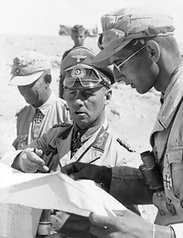Rommel called on a fat Italian major who was commanding one of the road-construction battalions. […] The rotund major…was a…vivacious fellow, and kept us smiling. Rommel asked him whether there were any complaints. The major replied excitedly: “Si, si, Signor, Generale, the food is very monotonous and the vino is not good!”
Rommel looked with a mischievous smile at the fat little figure and murmured gently: “And yet it does not seem to be doing you any harm!” [From Chapter 13]
For a war memoir, the book is surprisingly light in tone, peppered with that “German humor” like Rommel’s above remark to that Italian major.
Here is another example. Flies were all over North Africa. Schmidt (the author), e.g., tells a general visiting from Berlin that “the unbearable part of the life [in North Africa] is the aggression of millions of flies. They settle on the food in thousands […]” [ch.9]. The author relates a farcical scene at the headquarters of one of the Afrika Korps’ constituent divisions. Picture this, sometime in 1941 (In the serious context of a German field command center!) —
I was made at home in the 5th Light H.Q. mess. On an inside bulkhead of [General] Streich’s Mammoth [a large armored vehicle serving as a mobile headquarters] I noticed a large Knight’s Cross made of cardboard. But instead of the usual central swastika, it carried a sketch of a large black fly. Hauser explained to me that the Knight’s Cross was awarded ceremoniously every evening to the inmate of the Mammoth who had ‘shot down’ the largest number of the pestilential Desert flies during the day. I could understand their preoccupation with this unpleasant diversion, but I also began to appreciate Rommel’s more single-minded insistence that his subordinates should display initiative, aggressiveness, and ‘hardness’ in the face of the enemy. He had no time for frivolity.
[Rommel] had just one recreation — swatting flies. Daily during the lunch hours he dedicated himself to the task of systematically destroying as many of these pests as possible. [Ch.11]
Here is another. Rommel was called to Rome to celebrate his 49th birthday in November 1941. The author narrates:
They [Rommel, his wife, and close confidant General Ravenstein] attended the Opera [in Rome]. General von Ravenstein told me after the war that, as they emerged from listening to glorious singing, Rommel turned to him in the foyer and discussed not opera but, at once, what had obviously been engaging his thoughts: “Von Ravenstein, we must shift those battalions in the Medawwa Sector…” [Ch. 17]
One day a large parcel of books arrived from her. Rommel asked me to take them to the troops at Halfaya [on the Egypt-Libya border; the frontline]. I examined the books and was amused to note that they consisted entirely of “trashy literature” of the type that those who managed the Third Reich had condemned as fit only for the bonfire of the Decadent Democracies.

